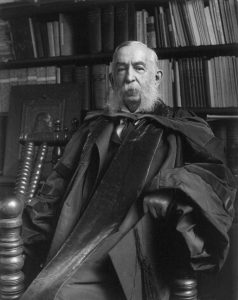 University Archives recently completed a project funded by the National Historical Publications and Records Commission (the granting arm of the National Archives) to digitize approximately 65,000 pages of letters received and sent by Daniel Coit Gilman. Gilman was Johns Hopkins University’s first president and is widely regarded as one of history’s most important education innovators. It could be argued that Gilman’s impact on the identity of Johns Hopkins University eclipses even that of our University’s namesake, Johns Hopkins.
University Archives recently completed a project funded by the National Historical Publications and Records Commission (the granting arm of the National Archives) to digitize approximately 65,000 pages of letters received and sent by Daniel Coit Gilman. Gilman was Johns Hopkins University’s first president and is widely regarded as one of history’s most important education innovators. It could be argued that Gilman’s impact on the identity of Johns Hopkins University eclipses even that of our University’s namesake, Johns Hopkins.
The Daniel Coit Gilman papers rank among our most popular special collections, a testament to the wide-ranging interest in Gilman’s influence. His correspondence files represent a veritable who’s-who of late 19th and early 20th century intellectuals, educational innovators, political activists, politicians, and other scions of American culture.
One of the parts of this collection I personally find compelling is the series of letters Gilman exchanged with two titans of the civil rights movement, W.E.B. DuBois and Booker T. Washington. Gilman was an early champion of DuBois’s work. He also served as a juror of educational exhibits at the Atlanta Exposition of 1895, which grew out of Booker T. Washington’s “Atlanta Compromise” speech, important and controversial at its time and today. That Gilman served as a connection between these two influential, and sometimes adversarial, civil rights leaders demonstrates the cultural regard for Gilman during his years as President.
We are delighted that NHPRC has allowed us to provide even greater access to the work of this singular individual. I encourage you to visit an online exhibit we have created featuring highlights from the collection. To access all of the digital content, please consult the Daniel Coit Gilman papers finding aid. And to explore more resources and projects related to Hopkins history, visit our Hopkins Retrospective site.
